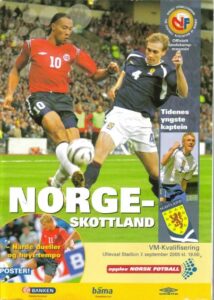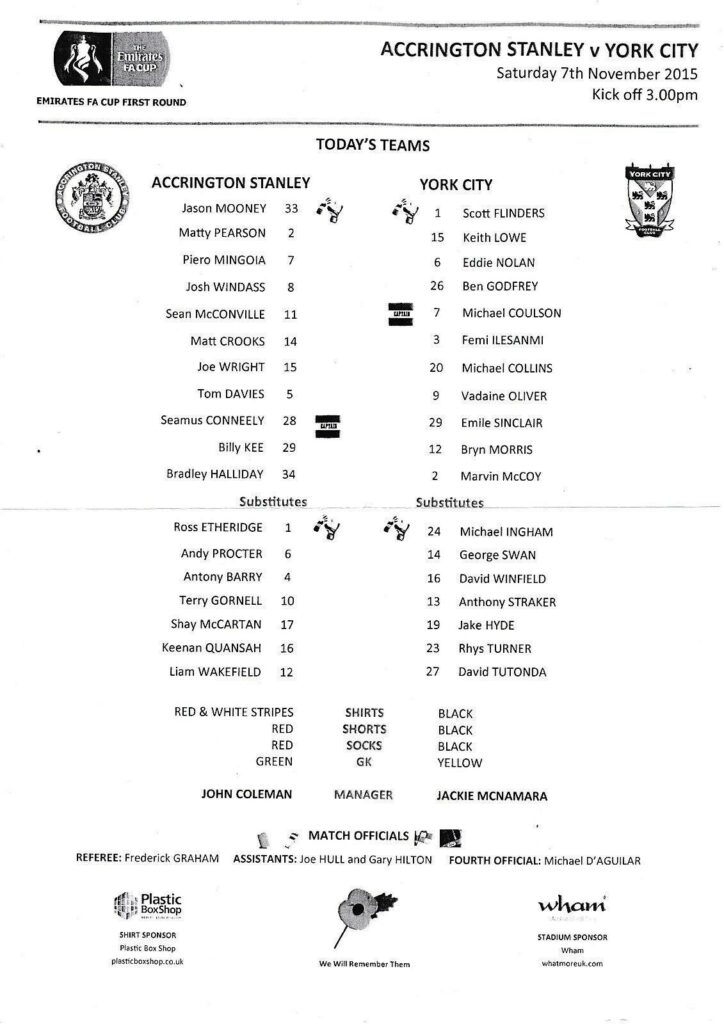Book Review: His Name is McNamara by Jackie McNamara (with Gerard McDade)

“I should have played you more son.”
So said Martin O’Neill after Celtic icon, Jackie McNamara’s testimonial at Celtic Park, and it is a wish that we all had, when he retired from playing. According to his autobiography, it is a sentiment that he wishes the national manager, Craig Brown shared. But of that, more later.
There is perhaps a prejudice about footballers that they are perhaps a little less than bright. Bucking the trend has always been the likes of Pat Nevin, the reluctant footballer, but here we have a man who has faced death and returned to tell the tale whilst combining a career that went from being a cultured player on the park to a much-lauded manager that ended with a curious position as a Chief Executive. Aside from the managerial role, the parallels with Nevin are secure.
His Name is McNamara is a stellar run through the career within football with the backdrop of a collapse at home on the 8th of February 2020 which shaped his future and weaves throughout the biography. McNamara suffered a brain haemorrhage that day, which saw him hospitalised for a prolonged period of time.
His tale begins with McNamara telling us one thing that, on reflection, we should have known – he is a fighter. Given that he ended up in surgery more than once, it should have been more obvious, but then again, as he explains, he is a middle child. His story takes us from that settled and loving family environment through an apprenticeship, to an icon in a hooped shirt, a Midlands sojourn, a North East swansong, a fledgling managership in Glasgow, a mixed experience beside the Tay and then to be the next English import in lower league football ending with a curious period of time as a Chief Executive. Running throughout is the story of his illness and recovery from the darkest place; it makes for a powerful read.
Throughout he pays special attention to those to whom he owes a debt. For example, there is a touching reference to Sandy Brown, the “someone” who saw his potential and started his progress in the professional ranks. His first club, Dunfermline Athletic then managed by the legendary Big Jim Leishman, now the mayor of Dunfermline was critical. ‘Big Leish’ was one of the biggest characters in Scottish football, though for McNamara, his influence was short lived as he was off, soon after his signing in the way that many managers are mutually relieved of their duties. McNamara became introduced to the fleeting passage of a football manager.
His senior debut, thanks to another Scottish legend, Jocky Scott came in the B & Q Cup – it would take too long to explain what that was – but from such minor cups came the man who would bag 4 Scottish Premier League titles, 3 Scottish Cups, and 2 Scottish League Cups, as well as appearing as player and manager in 6 other cup finals! It’s a remarkable journey and McNamara keeps the foot on the gas as he tells it.
By the time that McNamara was at Celtic, when there were trophies being won, it was also during his time when Rangers were going for 10-in-a-row. Achieving a 10th Scottish Premiership title would have handed their bitter rivals the ultimate boast – that Celtic’s greatest domestic achievement of winning 9 titles in a row was now second best to Rangers’ domestic achievement of 10.
McNamara tells of how manager Wim Jansen, in his one and only year as manager of Celtic, stopped the 10-in-a-row party in Ibrox. It is already the stuff of legend, but McNamara provides insights into all the backdrop, the background and the respect Jansen held during his time in charge. Such insight includes how the “Smell the Glove” t-shirt came about – which is mundane and fascinating – and the bizarre nature of the management in the club at the time – which is not. This includes the match in Portugal they had to play just after winning the title came about because it was part of the contractual agreement that brought Jorge Cadete to Celtic. From the outside, this was one of the increasingly bizarre episodes of the time and it ended with Jansen despite being the hero of the season not being given another contract.
And then there were the Scotland games.

McNamara appeared at a World Cup and the infamous game played in Tallinn. The home side, Estonia refused to show up and Scotland kicked off against nobody. It was where McNamara made his international debut, lasted 3 seconds and never touched the ball. Mind you, neither did 9 of his teammates!
McNamara though not shy to criticise, does so with decorum. Of course, there are those with whom he did not quite get on – Ian McCall being one, Craig Brown another – and those with whom he had a flourishing relationship – Simon Donnelly (Sid), John Hartson, Martin O’Neill and Henrik Larsson (who wrote the foreword). For each there are words of truth written without rancour and without hyperbole. It is true that he lets his feelings out, but he recognizes where his bitterness should end and his understanding, given the circumstances he has found himself facing, colour his views of the past.
From Celtic he found himself signed for Wolverhampton Wanderers, helping them get to the play-offs, then to the twilight of his career in the Premiership with Aberdeen, before signing for Falkirk. His time at Falkirk included a loan spell at Partick Thistle which was prematurely ended by a horrendous leg break at Somerset Park. I know, I saw it. He recovered, signed permanently for Thistle and then took his first steps into the dugout by becoming their manager, following Ian McCall’s departure, for the 2011/12 season.
I interviewed McNamara when he was the boss at Partick Thistle and aside from the well-worn cliché used to describe him – that he appeared to be quite shy of the media, wanting to give praise more than accept it – he always struck me as an assured reader of the game. There was a quiet confidence that was far from the swagger of many of his contemporaries. You got the feeling that whilst other bosses would kick the cat and harangue the family after a loss, McNamara would welcome reflection and a quiet period to piece together what went wrong and then plan more effectively for the next game. Whilst this is an observation from one who does not know him, it is fully backed by the autobiography which shows a man who faced death and rather than succumb to self-pity has reflected, counted his blessings and realised how fortunate he is.
He made such an impression at Thistle, that he was ironically transported to Dundee United. Ironic, because it was to the same club that Ian McCall had gone to and failed to ignite. What was to happen to McNamara was an exit under a cloud. That cloud was a suggestion that McNamara had financially benefitted from two transfers of United players which soured his reputation. McNamara, though not denying that there may have been some form of contractual advantage to him through transfer fees, makes it very clear that he did not benefit, if at all, to the value that had been claimed. That he then goes on to suggest that his well-publicised fall out with the youth team coach, Stevie Campbell, was due to the fact that Campbell who had previously benefitted from financial inducements when his youth team players graduated to the first team. Such an arrangement was threatened because McNamara was bringing players into the club rather than promoting them from within. It strongly suggests there was a culture in the club of financial benefit for successful staff. It is therefore not a leap to believe that McNamara may have also had such a clause in his contract. Having said all that, McNamara, given what he has been through has little reason to lie. There is no reason for him to apply to be back in the manager’s chair. So why try and repair his own reputation? Here he believes that Campbell had leaked the story out of spite. It is his one bitter note.

The manager’s chair at York City was his next destination and whilst up in Scotland, we knew of the City and its football club, we struggled to fathom why a young Scottish manager of such great ability would end up at a League Two club. After a few training sessions and games, it would appear that McNamara was unsure too.
Taking his friend, Simon Donnelly with him to be part of the coaching set up, he discovered that Donnelly was probably the best player in the club! His work was cut out. His reason for going was wrapped up in his relationship with Chairman, Jason McGill. It endured a relegation down into the National League and led to McNamara taking the role as CEO of the club. It was here that things began to unravel as a new manager arrived without a new philosophy. It was an old school way of doing things which were more than a clash of personalities. By the time that McNamara left the club, Jason had sold it and the McNamara family had settled in Yorkshire.
In a strange left field kind of way, his next move was to write a comedy, The Therapy Room. Though it never got past the pilot stage, it used his experiences in creative fashion and it could be argued that his name carried the opportunity to it being made at all. He also tried his hand at a variety of post retirement ventures which have sustained him to an extent and are covered in summary more than detail.
Throughout the book chapters are introduced with the slow revelation of the events of his illness, from the day it began through the setbacks and the recovery to the final pages. By the end he is out the hospital and with family. The former owner of York City and his wife, having proven to be true friends, McNamara can look forward to the future being just where he has settled. There is a contentment which travels across the page. He talks of how managers in football can be stuck in a bubble. For him, that bubble, truly has burst. Whether the experiences of the allegations at Dundee United or relegation at York City prepared him fully for life beyond the dugout, his collapse, coma and concerned family, have provided him with the future based upon a reality which is far more secure – his faith and his health.
McNamara credits his collaborator, Gerry McDade with a great deal of the fluidity and success of the book. Whether it be a footballer with a decent education or a writer with exceptional source material, this has the types of lessons and insight that make it a very easy read. It has proven that McNamara beyond the white line was just as compelling with a ball at his feet as with a pen in his hand – even one guided by McDade.
Donald C Stewart
(Publisher: Pitch Publishing Ltd. September 2021. Hardcover: 320 pages)
Buy your copy here:Jackie McNamara